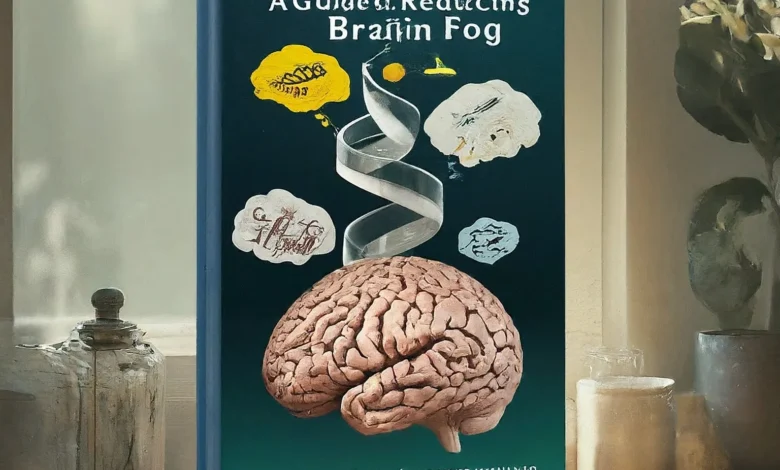A Guide to Reducing Brain Fog through Lifestyle Adjustments

Have you ever felt like your mind is wrapped in a thick fog, making it hard to think clearly or focus? If so, you’re not alone. This common experience is known as brain fog, and it can significantly impact your daily life. The good news? Simple lifestyle changes can help clear the haze and sharpen your mind.
In this guide, we’ll explore practical ways to reduce brain fog and boost your mental clarity. From diet tweaks to exercise habits, we’ll cover a range of strategies that you can easily incorporate into your routine. Get ready to discover how small adjustments can lead to big improvements in your cognitive function and overall well-being.
Understanding Brain Fog
What is Brain Fog?
Brain fog isn’t a medical condition itself, but rather a term used to describe a set of symptoms affecting your ability to think. It’s like a mental cloudiness that makes it challenging to concentrate, remember things, or process information quickly.
Common Symptoms of Brain Fog
If you’re experiencing brain fog, you might notice:
- Difficulty concentrating on tasks
- Forgetfulness or trouble recalling information
- Mental fatigue, even after a good night’s sleep
- Slower thinking or processing speed
- Confusion or disorientation
- Trouble finding words during conversations
- Lack of mental clarity or “fuzzy” thinking
Potential Causes of Brain Fog
Brain fog can stem from various factors, including:
- Poor sleep habits
- Chronic stress
- Dehydration
- Nutritional deficiencies
- Hormonal imbalances
- Certain medications
- Medical conditions (e.g., fibromyalgia, chronic fatigue syndrome)
- Lack of physical activity
- Overconsumption of processed foods or alcohol
Understanding these potential causes is the first step in addressing brain fog. By identifying the factors that might be contributing to your mental cloudiness, you can take targeted actions to improve your cognitive function.
In the following sections, we’ll delve into specific lifestyle adjustments that can help reduce brain fog and enhance your mental clarity. From optimizing your diet to incorporating brain-boosting exercises, you’ll discover practical strategies to lift the mental haze and think more clearly.
The Role of Diet in Reducing Brain Fog
What you eat plays a crucial role in how your brain functions. Let’s explore some dietary adjustments that can help clear the mental haze.
Hydration: Your Brain’s Best Friend
Proper hydration is essential for optimal brain function. Even mild dehydration can impair your cognitive performance and contribute to brain fog.
How Much Water Should You Drink?
Aim for about 8-10 glasses of water per day. However, your exact needs may vary based on factors like activity level, climate, and overall health.
Tips to Increase Your Water Intake:
- Keep a water bottle with you throughout the day
- Set reminders on your phone to drink water regularly
- Flavor your water with fresh fruits or herbs for variety
- Eat water-rich foods like cucumbers, watermelon, and zucchini
Brain-Boosting Foods
Incorporating certain foods into your diet can support cognitive function and help reduce brain fog.
| Food | Brain-Boosting Benefits |
|---|---|
| Fatty fish (salmon, sardines) | Rich in omega-3 fatty acids, supports brain health |
| Blueberries | High in antioxidants, may improve memory |
| Nuts and seeds | Provide vitamin E, which protects brain cells |
| Dark chocolate | Contains caffeine and antioxidants for improved focus |
| Leafy greens | High in nutrients that support brain function |
Foods to Avoid
Some foods may contribute to brain fog. Try to limit or avoid:
- Processed foods high in artificial additives
- Excessive sugar, which can lead to energy crashes
- Alcohol, which can impair cognitive function
- Refined carbohydrates that cause blood sugar spikes
The Impact of Sugar and Processed Foods
Consuming too much sugar and processed foods can lead to inflammation and oxidative stress in the brain, potentially worsening brain fog. Instead, opt for:
- Whole grains
- Fresh fruits and vegetables
- Lean proteins
- Healthy fats like avocados and olive oil
Exercise and Physical Activity for Brain Health
Regular physical activity is a powerful tool for combating brain fog and improving overall cognitive function.
Aerobic Exercise: Get Your Blood Pumping
Aerobic exercise increases blood flow to the brain, promoting the growth of new brain cells and improving overall brain health.
Recommended types and duration:
- Aim for at least 150 minutes of moderate-intensity aerobic activity per week
- Try activities like brisk walking, jogging, swimming, or cycling
- Break it up into 30-minute sessions, 5 days a week
Strength Training: Build Your Body and Brain
Strength training not only builds muscle but also supports cognitive function. It may help improve memory and reduce the risk of cognitive decline.
Simple exercises to incorporate:
- Bodyweight squats
- Push-ups (modified if needed)
- Lunges
- Planks
- Resistance band exercises
Mind-Body Exercises: The Power of Mindful Movement
Practices like yoga and tai chi combine physical movement with mindfulness, offering unique benefits for reducing brain fog.
Benefits include:
- Reduced stress and anxiety
- Improved focus and concentration
- Enhanced mind-body connection
Getting started:
- Look for beginner classes at local gyms or community centers
- Try online video tutorials for guided practice at home
- Start with just 10-15 minutes a day and gradually increase
By incorporating these dietary changes and exercise habits into your routine, you can take significant steps towards reducing brain fog and improving your overall cognitive health. Remember, consistency is key – small, regular efforts can lead to substantial improvements over time.
Sleep Hygiene and Brain Fog
Quality sleep is crucial for cognitive function and reducing brain fog. Poor sleep can significantly impact your ability to think clearly and focus throughout the day.
Tips for Improving Sleep Hygiene
- Stick to a consistent sleep schedule, even on weekends
- Create a relaxing bedtime routine to wind down
- Avoid screens for at least an hour before bed
- Keep your bedroom cool, dark, and quiet
- Limit caffeine and alcohol, especially in the evening
- Exercise regularly, but not too close to bedtime
- Use your bed only for sleep and intimacy
Recommended Sleep Duration
| Age Group | Recommended Hours of Sleep |
|---|---|
| Adults (18-64) | 7-9 hours |
| Teens (14-17) | 8-10 hours |
| School-age children (6-13) | 9-11 hours |
| Older adults (65+) | 7-8 hours |
Remember, individual needs may vary. Pay attention to how you feel after different amounts of sleep to determine your optimal duration.
Stress Management Techniques
Chronic stress can contribute significantly to brain fog. Implementing effective stress management techniques can help clear your mind and improve cognitive function.
Mindfulness and Meditation
Mindfulness practices can reduce stress and improve focus, helping to alleviate brain fog.
Simple mindfulness exercises to try:
- Deep breathing: Take slow, deep breaths for 5 minutes
- Body scan: Mentally scan your body, noticing sensations without judgment
- Mindful observation: Focus intently on an object for 5 minutes, observing its details
- Guided meditation: Use apps or videos for structured meditation sessions
Time Management and Organization
Clutter and disorganization can contribute to mental overwhelm and brain fog. Improving your time management skills can help clear both your physical and mental space.
Practical tips for better time management:
- Use a planner or digital calendar to track tasks and appointments
- Break large projects into smaller, manageable steps
- Prioritize tasks based on importance and urgency
- Implement the “two-minute rule”: If a task takes less than two minutes, do it immediately
- Declutter your physical space regularly
The Power of Mental Stimulation
Keeping your brain active and challenged can help reduce brain fog and improve cognitive function over time.
Activities to Keep Your Mind Sharp
- Read diverse materials to expose yourself to new ideas
- Solve puzzles like crosswords or Sudoku
- Play strategy games like chess or bridge
- Learn a new language or musical instrument
- Engage in creative hobbies like painting or writing
- Participate in stimulating discussions or debates
Learning New Skills
Acquiring new skills can help build cognitive reserve and reduce brain fog. The process of learning challenges your brain, creating new neural connections and improving overall cognitive function.
Benefits of learning new skills:
- Enhances neuroplasticity, your brain’s ability to form new connections
- Improves memory and recall
- Boosts problem-solving abilities
- Increases attention span and focus
Remember, the key is to choose activities you enjoy. This will make it easier to maintain consistency and reap the cognitive benefits over time.
By implementing these strategies for better sleep, stress management, and mental stimulation, you can take significant steps towards reducing brain fog and improving your overall cognitive health. In the next section, we’ll explore natural supplements that may support cognitive function and discuss when it’s appropriate to seek professional help for persistent brain fog.
Natural Supplements for Cognitive Support
While a healthy diet should be your primary source of nutrients, certain supplements may help support cognitive function and reduce brain fog. Always consult with a healthcare professional before starting any new supplement regimen, as they can interact with medications or have side effects.
| Supplement | Potential Benefits |
|---|---|
| Omega-3 fatty acids | May improve memory and reduce inflammation |
| Vitamin B Complex | Supports energy production and nervous system function |
| Ginkgo Biloba | May enhance circulation to the brain and improve memory |
| Lion’s Mane Mushroom | Potentially stimulates nerve growth factor production |
| Rhodiola Rosea | May help combat fatigue and improve mental performance |
How These Supplements May Work
- Omega-3 fatty acids are essential for brain cell structure and function.
- B vitamins play crucial roles in energy metabolism and neurotransmitter synthesis.
- Ginkgo Biloba is believed to improve blood flow to the brain and act as an antioxidant.
- Lion’s Mane Mushroom may promote the growth of brain cells and improve cognitive function.
- Rhodiola Rosea is an adaptogen that may help the body manage stress and fatigue.
Remember, supplements are not a magic solution. They work best when combined with a healthy lifestyle, including proper nutrition, regular exercise, and good sleep habits.
When to Seek Professional Help
While lifestyle changes can significantly improve brain fog for many people, persistent symptoms may indicate an underlying health condition that requires medical attention.
Signs That You Should Consult a Healthcare Professional
- Brain fog persists despite lifestyle changes
- Sudden onset of severe brain fog
- Accompanying symptoms like headaches, vision changes, or unexplained weight loss
- Significant impact on daily functioning or quality of life
- Memory problems that worsen or interfere with daily activities
- Mood changes such as depression or anxiety alongside brain fog
Types of Healthcare Professionals to Consult
- Primary Care Physician: Start here for a general evaluation and potential referrals.
- Neurologist: Specializes in brain and nervous system disorders.
- Endocrinologist: Can help if hormonal imbalances are suspected.
- Psychiatrist or Psychologist: For cognitive issues related to mental health.
- Nutritionist or Dietitian: For personalized dietary advice to support brain health.
Conclusion
Reducing brain fog is a journey that involves various aspects of your lifestyle. Let’s recap the main adjustments we’ve discussed:
- Optimize your diet with brain-boosting foods and proper hydration
- Incorporate regular exercise, including aerobic and strength training
- Prioritize quality sleep through good sleep hygiene practices
- Manage stress with mindfulness and organization techniques
- Stimulate your mind with challenging activities and learning new skills
- Consider natural supplements after consulting with a healthcare professional
Remember, consistency is key in reducing brain fog. Start by implementing small changes and gradually build upon them. Be patient with yourself – improvements in cognitive function often happen gradually over time.
We encourage you to take action today. Choose one or two strategies from this guide and commit to incorporating them into your daily routine. Whether it’s drinking more water, starting a new exercise regimen, or practicing mindfulness, every step counts towards a clearer, sharper mind.
By making these lifestyle adjustments, you’re not just fighting brain fog – you’re investing in your overall health and well-being. Here’s to a future of mental clarity, improved focus, and a happier, healthier you!



